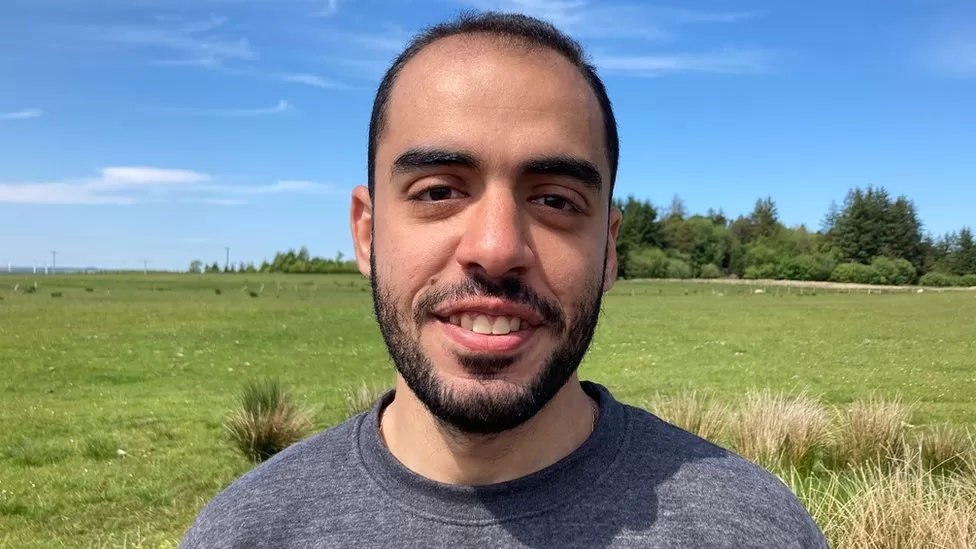An Egyptian man with a rare genetic disorder has won a last-ditch attempt to prevent his removal from the UK.
Youssef Mikhaiel, 28, was due to be deported on Monday – but that was postponed after his case was taken to the Court of Session in Edinburgh.
The graduate engineer has Fabry disease, which damages the heart, kidneys and nervous system, and cannot access treatment in his home country.
The Home Office says it still intends to remove him from the UK.
Mr Mikhaiel had been held at Dungavel House detention centre in Lanarkshire for the last two weeks, but was released on bail on Friday afternoon.
A petition for his release had gathered 21,000 signatures within 48 hours.

Mr Mikhaiel told BBC Scotland that he was still anxious because the threat of deportation was still on the table.
“I don’t want anything to affect my family or myself, because I still care about my medication condition, how it will affect my lifespan, my career and my future.
“I hope it gets sorted soon,” he said.
Fabry disease in an inherited condition in which enzymes cannot break down fatty materials known as lipids, allowing them to build up in the body.
The disorder causes symptoms including chronic pain and high temperatures and can shorten a person’s lifespan.
Mr Mikhaiel claims that if he were sent back to Egypt, he would not be able to access a drug called migalastat, which is used in Scotland to treat Fabry disease.

In a letter seen by BBC Scotland, officials at Misr International Hospital in Egypt confirmed that the country’s drug authority does not provide the medicine.
It said: “Undoubtedly, the absence of his required treatment for his rare disorder in Egypt would cause intense suffering or death.”
The letter added that life expectancy in untreated men was just over 50 years.
Mr Mikhaiel said that returning to Egypt would affect his health, both physically and mentally.
“I didn’t ask for this,” he added.
“I came here legally for study on a student visa, until I was diagnosed by the NHS in Glasgow.
“It took them almost a year before they knew what I had.”

Mr Mikhaiel arrived on a student visa in 2016 and graduated in aeronautical engineering at Glasgow University in 2019.
His visa expired the same year and he applied for leave to remain after he was diagnosed with Fabry disease.
However, his application was refused over a failure to provide evidence in December 2021.
For the last year, he has been reporting to immigration officials in Glasgow.
His solicitor Usman Aslam obtained the letter from Misr Hospital on 15 May. However, Mr Mikhaiel was detained by Home Officials the following day.
On 19 May, Mr Aslam applied to get his client out of detention. He said that he showed the Home Office the letter from the hospital to demonstrate the seriousness of Mr Mikhaiel’s condition.
When the Home Office then ordered that he should be removed from the UK, he applied for leave to remain on medical grounds.
Such claims rely on Article 3 – freedom from torture or inhuman treatment – and Article 8 – the right to a family life – under the European Convention on Human Rights (ECHR).

Mr Aslam said: “That should have stopped that removal. End of story.
“Instead, they continued to say they were going to remove him on Monday 5 June.
“That forced my hand to go to the highest civil court in Scotland.”
Mr Mikhaeil’s petition for a judicial review was accepted by the Court of Session on Thursday. The court will now have to decide whether the Home Office was right to attempt to remove him from the UK while there was an application pending.
He was released from Dungavel the following day, and was met at the gates by his partner Sarah Bradley.
The Home Office said it does not comment on individual cases.
In a statement, it said: “Detention plays a key role in maintaining effective immigration controls and securing the UK’s borders, particularly in connection with the removal of people who have no right to remain in the UK but who refuse to leave voluntarily.
“We take the welfare of people in our care extremely seriously and have a range of safeguards in place, including round the clock access to healthcare professionals for those in detention.”

